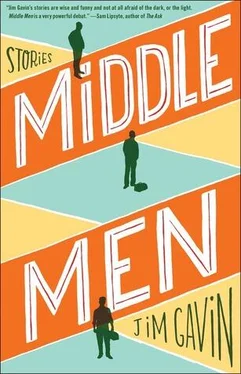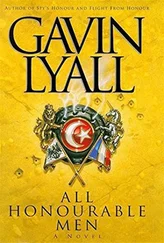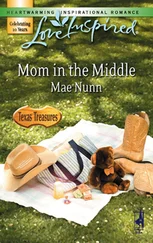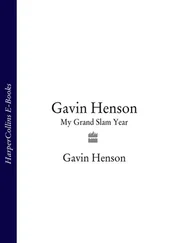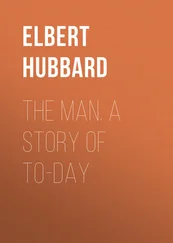One side of the soundstage was draped with a massive banner, forty feet high, that featured the looming gaze of Max Lavoy. As he got out of the golf cart, Max paid no attention to the iconography of himself. Adam skipped past Max, swiped his badge, and opened the side door that led to his dressing room.
“Do you need anything else, Mr. Lavoy?”
“No, I can manage. I’m not a fucking child.”
The door slammed shut behind him.
• • •
For the next two hours, as lights were tested and contestants prepped, Adam drove the Benz back and forth between the research library and the soundstage production booth, delivering game scripts and updated schedules for promo shoots. After his last run before taping started, he bumped into Doug outside the office. Doug, on his smoke breaks, always wore a leather gimp mask. It was black with silver zippers. Doug had made friends with all the prop masters on the lot and he kept his office stocked with weird getups. A few years ago he wore the gimp mask outside on a dare, delighting the Teamsters who were lined up at the lunch trunk, as well as a passing tour group, who snapped pictures of him. Doug enjoyed the attention and he wore the mask a few more times. It got to the point that the tour guides began to look for this lurid creature, pointing him out as a hallowed studio legend, like the ghosts that supposedly haunted Stage 21. Doug was now weary of the attention, but he told Adam that he felt an obligation to maintain the facade of wackiness. During Adam’s time as a temp, in which he stuffed over sixty thousand envelopes, most of the staff treated him politely, but nobody asked him anything about himself. Doug was the only person who acknowledged the possibility that Adam had a life beyond stuffing envelopes. He had spotted Adam going off to lunch one day with a copy of The Man Who Was Thursday in his hand, and a righteous bond was forged.
“Well?” he said.
“I drove around in a golf cart with Max Lavoy.”
“Living the dream, bitch.”
“I asked if he needed anything else, and he said, ‘I’m not a fucking child.’ That was the single greatest moment of my life.”
“The man is human,” said Doug. “Don’t forget that.”
“When I was growing up my family watched him every night at dinner.” Adam pointed to the distant banner of Max. “We’d sit on the couch and shout the answers.”
“I hear that a lot.”
“I’m stoked.”
“You’ll get sick of it,” said Doug. “And then you’ll hate yourself for getting sick of it. I’ve got five more years guaranteed on my contract. Five years! Nobody in town has that and I still curse God because I haven’t sold my pilot.”
“I didn’t know you wrote a pilot.”
“I contain multitudes.”
“What’s it about?”
“It’s called Paralegals . It explores the world of paralegals.”
“Fuck you. I love it here.”
“Yeah, but you’re young and stupid. And ugly.”
“If you knew some of the jobs I’ve had.”
“I was a writer’s assistant on Mr. Belvedere .”
“Jesus Christ,” said Adam.
There was a grim silence, as if Doug had just confessed his role in some infamous wartime atrocity.
“So how’d you end up writing questions for Max?”
“I don’t know,” said Doug, releasing smoke from his zippered mouth. “I sort of failed my way to the top.”
He put out his cigarette on the side of his head and went back inside.
Most of Adam’s responsibilities involved prep work, so once taping started he didn’t have much to do. For a while he checked his email and fantasy sports leagues; then he took out an index card and put together his open mic set for later that night. Trying to perfect one bit, he crossed out the word cabrón , replaced it with puto , but after thinking about it for a long time, he crossed that out and put cabrón back in. It was torture making these kinds of decisions.
He got a free lunch ticket on tape days — the studio perks were coming thick and fast — and on his walk back from the cafeteria, he stopped by the soundstage to pocket free cookies and watch Max in action.
Black curtains surrounded the gilded set. The wings were hushed and dark and Adam found a place behind the contestant coordinators, who stood poised with hair gel and bottled water. Max, taking his cue, walked over and chatted with the contestants. The first one, a pediatrician from Omaha, flubbed her defining personal anecdote. Max covered his mic and whispered something that made her laugh. It was a polite laugh, but that didn’t matter; looking more relaxed, she did fine on the second take, describing a fairly benign misadventure on her honeymoon in Yellowstone, and there was palpable relief in the studio audience. Adam had to give Max credit. Though pompous and strange, he was good at his job. Because they taped five shows a day he only worked about fifty days a year, pulling in ungodly sums of money, but still, everything depended on him, and if he were ever to quit, it would spell doom for everyone on staff, from the executives down to the production assistants.
“Good, you’re here,” whispered Melanie, suddenly behind him. “Max is out of Diet Rite.”
“No.”
“Yes, it’s true,” she said, in a dry, withering tone that Adam loved. “I need you to stock the fridge in his dressing room before this game ends.” She handed him the key. “The holiest of holies. Don’t linger.”
Adam made a lap of the set, first grabbing a twelve-pack from the pantry, and then moving with stealth toward the dressing room, which was just on the other side of the giant blinking game board.
The dressing room had a nice leather couch, a coffee table piled with magazines, and a small closed-circuit television tuned to the live feed of the game currently in progress. There was a large mirror surrounded with lightbulbs, and on the dressing table below it a framed photo of Max with a German shepherd. In contrast to the natural solemnity of the dog, Max’s smile was eager and silly. Black-and-white publicity shots covered the far wall, but in these his smile seemed less genuine: Max getting his star on the Walk of Fame, Max with some underprivileged kids, Max hamming it up with Leonard Nimoy.
Adam stocked the mini-fridge and then, for a long time, he just stood there, lingering. Faintly, he heard the final-round theme song begin, which meant that he had at least thirty seconds to take advantage of the blazing mirror. After a medley of bad impressions — Connery, Bronson, Shatner — he did an abridged version of Dirk Diggler’s concluding monologue from Boogie Nights , but when he got to the grand finale, he decided it would be tacky, in the these circumstances, to pull out his dick.
But he did it anyway.
The door started to open. Adam zipped up and then turned quickly, shamefully, to find a woman holding a blow-dryer and makeup kit. “Who are you?” she asked.
“I’m Adam. The new P.A.”
She started to nod, but hesitated.
“Max was out of Diet Rite.”
“Oh!” she said brightly, and this seemed to resolve everything. Adam forced a smile and left the room.
At four o’clock, when the final game wrapped, Adam collected all the game scripts and shredded them, for security purposes. The evening mail drop came and he spent a few minutes sorting Max’s fan letters. A lovestruck woman in Kalamazoo had decorated her envelope with hearts and question marks. When the last of the senior producers left, he waited five minutes, to give the impression that he was busy and working late, and then he turned off his computer and exited through a back door.
The rain had stopped. A shuttle made the rounds, taking people to the parking structure at the far end of the lot, but Adam preferred the long walk through the giant soundstages. He liked spying on the sets of future blockbusters. Now and then he saw a movie star, but he always got more excited when he identified a character actor. He was proud of this ability, thinking it showed a deeper commitment to the culture.
Читать дальше
